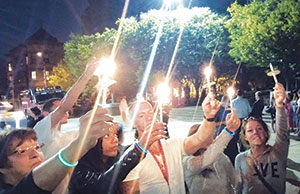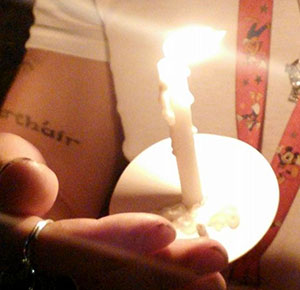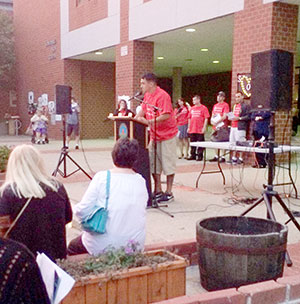
Somerville Overcoming Addiction has helped to shine a light on the need for compassion and positive action in the effort to give hope to those struggling with substance abuse.
— Photos courtesy of Judi Walker
By Patrick McDonagh
“I sat in a cell for seven days. I could not leave; defecating, throwing up on myself.” Jimmy Walker recalls the destructive trajectory of a former opiate addiction.
Walker survived six years in various Massachusetts super-max prison facilities; sentence served for addiction-fueled bank robbery that left three-year-old son, little Jimmy Walker, in grandmother Judi’s care. With access to narcotics in prison described as readily available, Jimmy’s habitual use would have ended in death had he not realized the necessity of self-worth.
“I think it is just the power of addiction,” Walker’s mother, Judi Walker, questions. “That you can watch your loved ones and your friends die and still do it.”
Chasing his girlfriend, a heroin user since 15, Walker fell into the habit after ten years of vehement opposition to the drug’s use. He equates his survival to the realization that his life is worth more than a bag of dope; a message Jimmy and fellow Somerville Overcoming Addiction (SOA) members have made a mission to share.
 How exactly an addict realizes self-worth is not universal, but Walker and SOA members agree on the certainty of the realization’s intrinsic nature. “An addict is not going to get clean unless they want to get clean,” says Walker. A best friend’s overdose death in the bathroom of the Galleria Mall incited his anger, and continued use of the emotion-numbing narcotic.
How exactly an addict realizes self-worth is not universal, but Walker and SOA members agree on the certainty of the realization’s intrinsic nature. “An addict is not going to get clean unless they want to get clean,” says Walker. A best friend’s overdose death in the bathroom of the Galleria Mall incited his anger, and continued use of the emotion-numbing narcotic.
Walker describes a psychosis-like tunnel vision, where the next high takes precedence over anything that once mattered. “I lost everything. I had to start selling all my stuff. I think it is an alter ego thing. When you are using you are definitely not yourself. You become this animal. The next high is all that matters. Your family, friends and kids don’t matter anymore. You don’t care about anything but that next high because you are sick. Then I was at rock bottom and hit a bank.”
Withdrawal in prison momentarily jolted this psychosis. Seven days isolation, a vomit filled cell was opened and hosed off. Skinny 180 lb. Walker was asked “Are you alive?” to which an affirmative response began the rest of his six years.
Sobriety for Walker began in prison, as did a learned positivity he brings to the SOA group. GED and HVAC certificates acquired, boxing a found prison passion, and dog training his opportunity to help handicapped in need; though heroin was available even throughout incarceration.
“There were drugs in jail, they were everywhere.” Jimmy says. “Do you know why I didn’t use in prison? Because my boys were over there stabbing each other over a piece of Suboxone. I wanted to live. I wanted to make it out of there. I figured out for myself that I am worth more than that.”
Similar life stories trade throughout the group’s meeting to no one’s surprise. SOA is a community led organization whose members have a versed experience with the destructive tendency of addiction. Most have lost loved ones to opiate abuse. Some are former addicts.
Group member Jesse Clingan shares SOA motivations. “As a group we address bringing information to people, bringing people resources, and breaking down stigma of addiction.” Overcoming social stigma and demonization of addicts is a core group motive. Addiction shaming and stigmatization is a familiar feeling for Walker, who hid his problem for years.
 How does one realize their life is worth more than a bag of dope? Walker responds with some firsthand insight. “You got to tell them that. You have to show them that. Let them know that they are not alone. I never had someone say that to me. My addiction was a hidden secret. I hid myself. I wouldn’t go around people.” Since SOA’s birthday of June 25, 2014, the organization has hosted candlelight vigils, meet and greets, and more recently, the Ryan Harrington Foundation’s Night of Hope and Awareness. Each event intended to provide education, to socialize, and to humanize addiction.
How does one realize their life is worth more than a bag of dope? Walker responds with some firsthand insight. “You got to tell them that. You have to show them that. Let them know that they are not alone. I never had someone say that to me. My addiction was a hidden secret. I hid myself. I wouldn’t go around people.” Since SOA’s birthday of June 25, 2014, the organization has hosted candlelight vigils, meet and greets, and more recently, the Ryan Harrington Foundation’s Night of Hope and Awareness. Each event intended to provide education, to socialize, and to humanize addiction.
Judi Walker was in charge of organizing names for the previous September’s SOA candlelight vigil. “I can remember nobody leaving the vigil. We had first responders, fire departments, ambulances, EMS’s. We had one of the firefighters dressed in full gear and played the bagpipes for us. The head of the firefighters union, Tommy Ross, used a 911 bell. I took care of the names. I think that the hardest thing about the names is when the pictures came. When you had a face to put to that name. They were coming and they weren’t stopping.”
Photos humanized the anonymity of a growing Massachusetts statistic. Prevention of overdose is priority for SOA, but at every hosted event the group distributes Narcan, an overdose reversal nasal spray. In partnership with Cambridge needle exchange, hosted Narcan trainings have educated and prompted parents to call Judi, confessing their training helped reverse an overdose and save a family member’s life.
“It doesn’t matter who you are, what you are, what sex, what religion, it is non-denominated, and it just doesn’t care,” Judi Walker says. “Addiction takes you and rips you to pieces.” She is happy to have her now nine-year-old grandson and her six years sober son Jimmy. Somerville’s SOA community is working to pick up the pieces left in wake of addiction, providing hope for recovering addicts seeking help.















Reader Comments